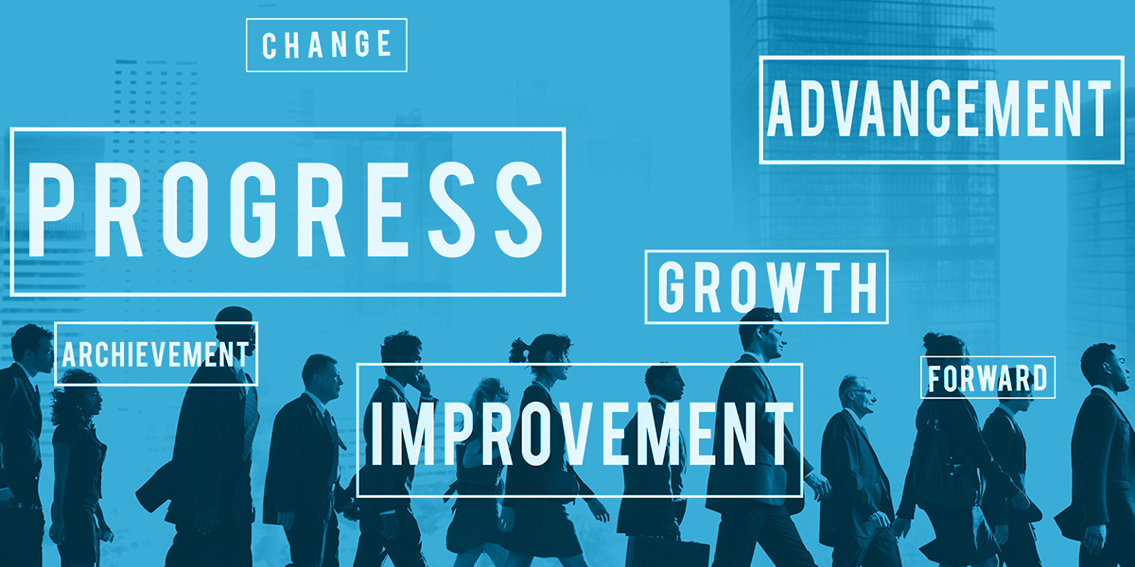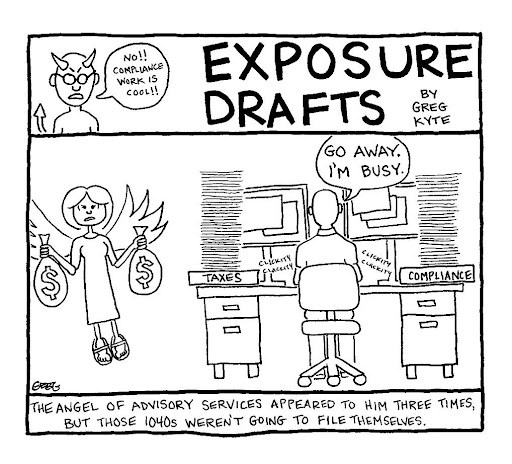Accountants everywhere are hearing the recurring message that we have to change. That we need to deliver AI-proof services in order to remain relevant. That the human connection is a uniquely human offering. We have to find a way to go beyond our traditional focus on balances, and reconciliations, and pivot tables (oh my!) and instead find ways to help our clients succeed in business. There are two main challenges to making the shift.

First, we are too busy.
We have stacks of returns piled up on our desks or financial statements to create. We have work to do. There are deadlines to meet and technical rules to catch up on. How do we stop doing what we have always done to make room for what we want to do? Even if the work is low value to clients, it still represents revenue. How can we turn revenue away?
Here’s a cartoon from the incredible Greg Kyte summing up the state of the profession for many accountants :

Figure 1 by Greg Kyte, CPA commissioned by Geni Whitehouse, www.theimpactfuladvisor.com
We must make space.
We can free up capacity once we make the commitment. We start with a thorough review of our existing work. We raise prices for the least profitable clients. We refer work to others. We outsource the repetitive work using tools like Botkeeper to help streamline the workflow and leverage AI. We start getting really clear on the kind of work we want to do and we hold out for clients that are seeking to do more. Download the spreadsheet that can help you start looking at your existing work for opportunities to free up capacity.
Second, how are we supposed to make that shift?
What kinds of services do we offer? We are used to having a checklist to follow. I left a CPA firm as a partner after 15 years in the profession because I knew there were client needs I wasn’t meeting as a tax professional. I went in search of technology as a tool for making a bigger difference. But that alone wasn’t enough. I could put in a new piece of software that no one understood and still have no impact. I needed a new way to work with my clients. I needed to ask different questions. I went in search of tools that I could use in making that shift.
And that’s when I discovered a roadmap for shifting from a historical perspective to a proactive future focus. (I acquired the rights to the online training during Covid and now teach others via www.theimpactfuladvisor.com.)
But it required me to make shifts in three areas:
-
Mindset
-
Toolset
-
Skillset

The mindset shift was the hardest. Especially when I moved from Atlanta to the middle of Napa Valley, California to work with wineries. Who am I to tell a winery owner anything about their business? Thanks to the training I had, I released the pressure to be the expert in the wine business and instead focused on asking questions that helped the winery owners share their expertise. Once I released the fear of not having all of the answers, I was able to add real value — in the form of process documentation, software selection, team training on financial concepts and more.
I went in search of new tools to help me better explain concepts that were not only alien to many but also terrifying. I found interactive dashboards, integrated reporting, customized scorecards, and a tool from my own training (Level 5 by Mentor Plus that I now teach) called the Profit Equation Planner ™. I found ways to bring numbers to life for owners, leaders, and front-line workers. In order to use those tools effectively, I needed new skills. I took DISC assessments and learned about different behavioral styles. Once I understood my own style, I learned how to communicate more effectively with others. I learned about Simon Sinek’s WHY and how to help others identify theirs. I learned how to process map, facilitate and train teams.
If you want to make the shift, or train members of your team in making a bigger impact, get help. First take the time to make space in your practice. Then look for coaches or tools (we offer more than 100 tools for use with clients) that can help give you structure and avoid what we call “Random Acts of Consulting” in Level 5 Advisory. There is plenty of help available, from automated solutions to individual coaching. Find a process or a coach or training that works for you and your team. You don’t have to do it alone and you already have the skills — you just need to leverage them in new ways.




